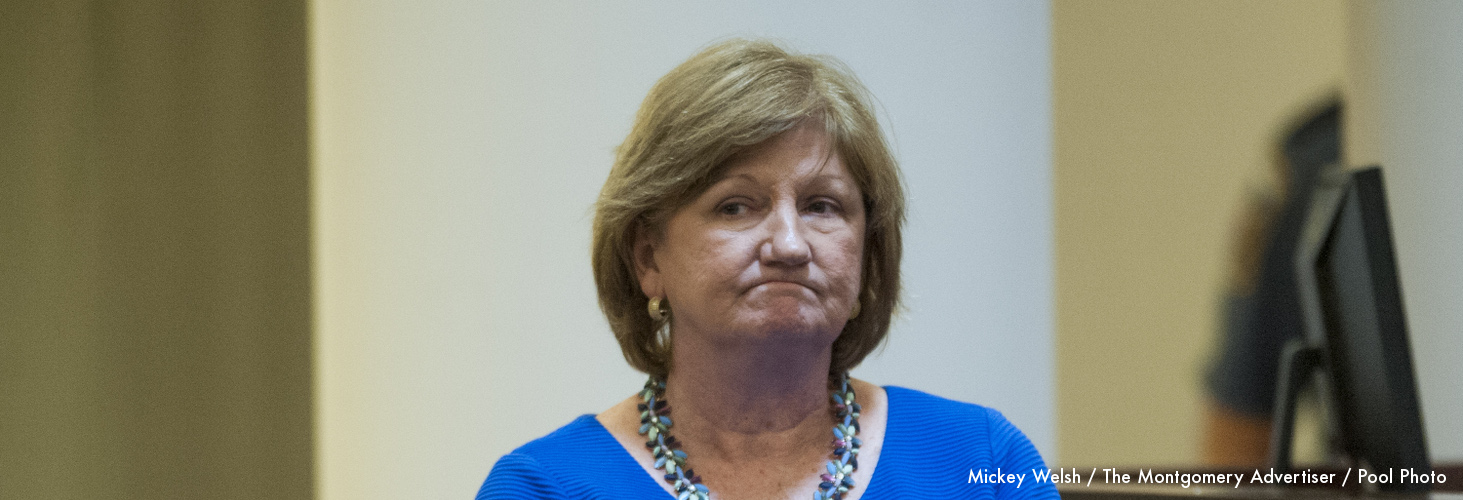By Chandler Walker
Alabama Political Reporter
Tuesday, Chief Justice Lyn Stuart paid a visit to Auburn University at Montgomery’s campus to celebrate the 228th anniversary of Constitution Day, which was actually this past Sunday, Sep. 17. Stuart, among others, engaged in a panel to discuss this year’s Constitution Day theme, “Freedom of Speech in our Democracy.” Other panel members present included: Dr. Nicholas Howard, an assistant professor in the political science and public administration Department; Dr. Linda Dennard, another professor in the same department; and David Hughes, also a professor in political science department, who acted as mediator.
The group touched on several topics, including some that could be considered controversial. Subjects such as the Neo-Nazi protests in Charlottesville, Virginia, internet regulation and how free speech is affected by it and if money is considered speech in regards to contributing and campaigning, which Stuart took a particular interest in.
When debating the Neo-Nazis and their hate speech, the panel members unanimously condemned the actions of the protestors.
“If we allow the threat of violence to threaten free speech, I’m not sure we have free speech at all,” Stuart said.
The panel members were questioned about hate speech and its place regarding free speech, given its derogatory nature, and they responded in a conventional fashion.
“Hate speech is constitutionally protected,” said Dr. Howard in a to-the-point manner. He was met with a response from Dr. Dennard, who stated, “Constitution hate speech is protected, but if it produced violence, then it is no longer protected. It will not defend anyone brandishing a gun.”
Hughes directed their attention to the segregation of speech in a democracy – such as when the protestors were separated from the counter-protestors in Charlottesville – and if it is considered a necessity to have opinions be heard and validated.
“A greater concern that I have is that if no one’s there to hear it, there will be no one there to challenge it,” Stuart answered. “And it is the challenge that comes as the result of free speech. To challenge the ideas of others. To give them the opportunity to perhaps hear a different point of view, or at least answer questions about why they believe what they believe. And to me, that’s the only avenue for change.”
The topic of internet regulation – considering that the internet is one of the largest public and private domains and provides ways for users to comment on almost any subject–positively or negatively–sparked an interest in the audience, which was made up of mostly AUM students, and Stuart seemingly gave her opinion the subject.
“If the internet is seething some of this division and violence, to a certain extent, I think the media itself is doing the same thing,” Stuart said. “Television’s out … that’s radio out, that’s whatever as public utilities, and we do, rather severely regulate them. And yet, so far you’re going to get a large part unregulated and mostly the providers who, on their own, take down sites based on complaints.”
Media regulation for children also played a small part in the conversation, with Stuart concluding that the government should not play a role in the regulation of television and internet for children and that it should be left solely up to the parents.
The discussion shifted to candidates in elections and if there should be caps on how much money is spent toward campaigning. The panel members offered various points and insights considering the subject, but Stuart commanded the panel with her thoughts.
“If you’re going to run publicly for election, it takes money to run, and so I think you can have restrictions, and there are states that have restrictions on the amount of money that can be spent, not who can contribute it,” Stuart said. “But the total amount that can be spent. The good news is, he with the most money does not win, and that has been established repeatedly.”
The panel members later joked and used Sen. Luther Strange, R-Ala., as an example of an expensive campaign that has been failing to win over potential voters, according to a recent poll that shows former state Supreme Court Chief Justice Roy Moore is polling ahead of Strange in favorability.
The Constitution Day discussion wrapped up shortly after, and the floor opened up for a Q&A session with the panel members. Panel members: Stuart, Howard, Dennard and Hughes were raised a great applause concluding the event. Stuart stayed behind to meet with students and take photos, while other members mingled.



















































